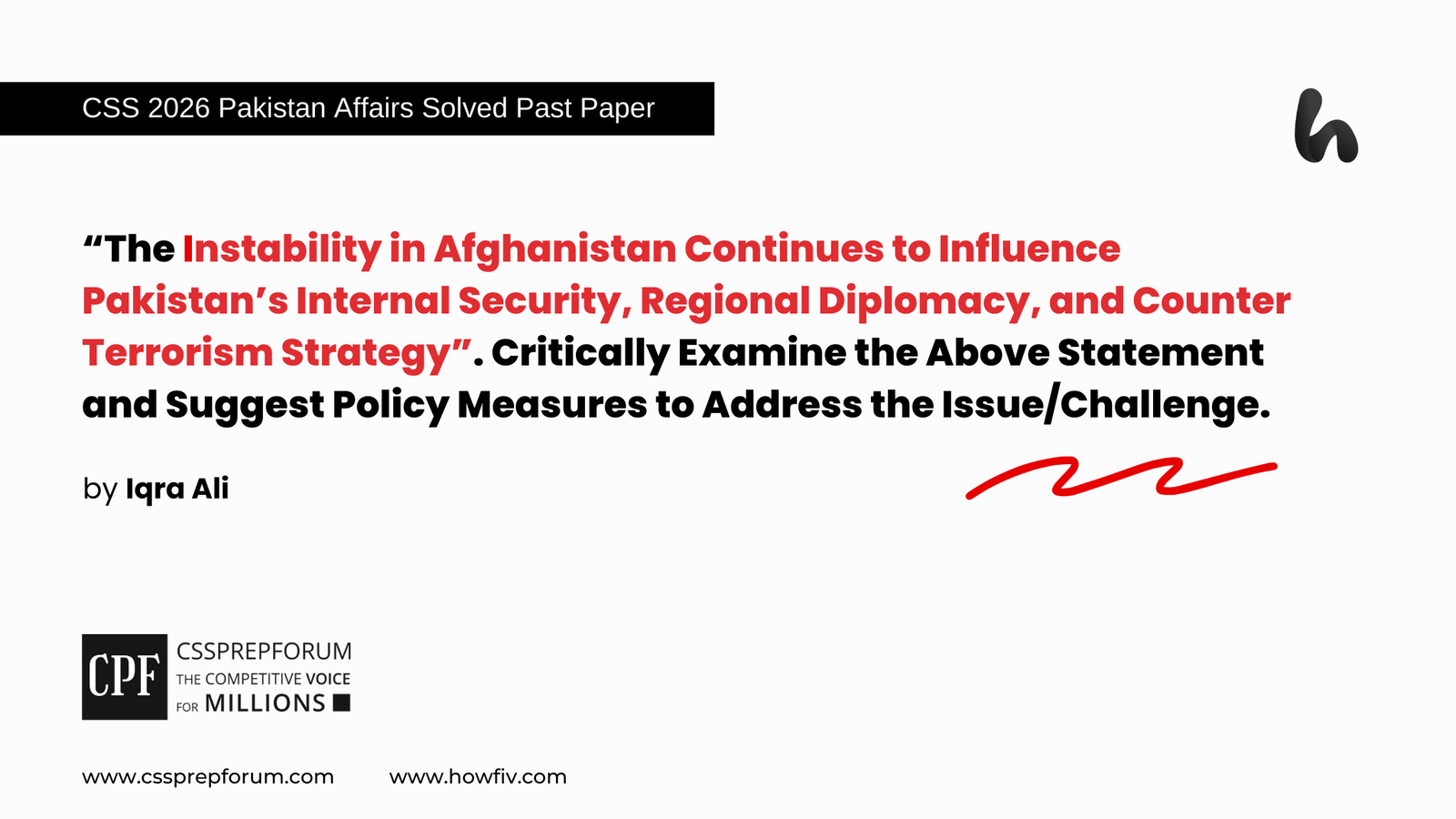The following article is written by Khizer Khan, a student of Sir Syed Kazim Ali. Moreover, the article is written on the same pattern, taught by Sir to his students, scoring the highest marks in compulsory subjects for years. Besides, the knowledge, case studies, quotes, and examples have been taught to him by Miss Irum Arif, the country’s top CSS and PMS Pakistan Affairs coach. For years, Miss Irum Arif, also Sir Kazim’s student, has been known for her teaching methodology and how she helps her students understand questions asked in the exam. Therefore, to help thousands of CSS and PMS aspirants, who visit Cssprepforum and Howfivfor better preparation, we have uploaded this article so they can understand how to crack a topic or a question, how to write relevantly, what is coherence, and how to include and connect ideas, opinions, and suggestions to score the maximum.

- Introduction
- Historical perspective: Situation in Akbar’s era
- Secular policies of Akbar
- Waived Jizya from Hindus
- Intermarriage between Muslims and Hindus
- Ban on cow slaughter
- Policy of Sulh-i-Kul
- Introduction of Din-e-Illahi
- The rise in the Bhakti movement
- Misinterpretation of Wahdat-ul-Wajood
- Growth of Unorthodox Sufism
2- Impacts of the reformist movement
Religious impacts
- Neutralised Akbar’s innovation in religion
- Tackled unorthodox Sufism
- Influenced Jahangir to re-impose Shariah laws
- Introduced philosophy of Wahdat-ul-Shahood
- Purified Muslim belief through the teachings of the Holy Quran
Social impacts
- Abolishment of inter-religious marriages of Hindus and Muslims
- Termination of Sajda-e-Tazami
- Transformation of the society through the observance of fast and zakat
- Reconstruction of mosques
Political impacts
- Introduced Two-Nation theory
- Influenced Jahangir to re-impose jizya
- Critical Analysis
- Conclusion

INTRODUCTION
Opposing Akbar’s policy of Sulh-i-Kul, which preached peace with all the religions, Mujadid-Alf-Sani- reviver of the second millennium-rejuvenated Islam in the Indian subcontinent by rendering his lifelong services for Islam. In his work, he stressed avoiding bidat and innovation in religion, negated the misinterpreted concept of Wahdat-ul-Wajood, rectified Muslims’ belief through the ideology of Wahdat-ul-shahud, and held Ulema-e-Su responsible for the downfall of the Muslim society. In addition, he stressed upon Muslims to purify their faith by following the Quran and Sunnah and not putting their faith in the Karamat or miracles of saints instead of the teachings of the Holy Quran. Through his reforms, he not only denounced Akbar’s Din-e-Elahi but also revived Muslim identity, creating an atmosphere of awareness in the Indian Sub-continent during Jahangir’s reign. As a result, Muslims became staunch believers of the Two Nation theory and strengthened their belief in the separatism of Islam from Hinduism and all other prevailing religions in the Indian Sub-continent.
HISTORICAL PERSPECTIVE
Mujaddid Alf Sani’s untiring efforts were a reaction against the miserable situation of Muslims and Islam in Akbar’s era. The already prevailing Bhakti movement – a nationalist movement with an ideology of one nation without any division of religion – threatened the Muslims’ separate identity in the Sub-continent, as it influenced many Muslim saints and the masses. In addition, the Mughal Emperor, Akbar, had already married a number of Hindu women, and the whole empire was under the influence of Hindu practices, such as refraining from cow slaughter, demolishing mosques and other religious monuments of Muslims. Moreover, Akbar had already abolished jizya, allowed intermarriage between Hindus and Muslims, and also introduced a new religion of his own, Din-e-Ilahi, standing on the concept of Sulah-e-Kul- peace with all religions. Moreover, the already prevailing misinterpreted philosophy of Wadat-ul-Wajood, no difference between man and his creator, was striking the very core of the Muslim belief. Furthermore, the ulema-e-Su, worldly-minded Ulemas, had ceased referring to Quran and Hadith in their commentaries and considered jurisprudence the only religious knowledge. Last but not least, Muslims had become so deficient in the true teachings of Islam that they had more belief in karamats and Miracles of saints rather than the Islamic teachings. Hence, all these reasons pushed Sheikh Ahmed Sirhindi to stand against the Mughal Emperors and rejuvenate Islam in its true essence.
The situation was so worst that it was given up in the royal society to openly speak (tasreeh) the name of the Prophet of Islam, the last of the chain of the prophets. And those, whose names were Muhammad and Ahmad, changed their names. Cow slaughtering, which had been one of the important symbols of the practices of Islam in India, was declared prohibited. The mosques and the tombs of the Muslims were ruined and demolished. The places of worship of the infidels were paid great reverence and their important festivals were celebrated with full honour and respect” Ithbat-un-Nabuwwat
INFLUENCE OF SHEIKH AHMAD SIRHINDI ON THE SUBCONTINENT’S HISTORY
Religious impacts
Through his reformist movement, Sheikh Ahmed Sir Hindi was successful in neutralizing Akbar’s innovation in religion, discrediting bidat, and changing the mentality of Akbar’s successors towards a more orthodox Islam. Under Mujaddid’s influence, not only Jehangir re-impose Shariah for the general public but also ended all the un-Islamic practices in the Mughal court. He looked upon the rulers as ‘all soul’ and the people as ‘all body’. According to him, if the soul goes wrong, the body is bound to go astray. The Shaikh declared,
“The King being on the right path means that the world is on the right path; his waywardness is the waywardness of the whole world.”
Through his makhtubats – letters written to his contemporaries in the Mughal court – and verbal preaching, he spread the message of Islam amongst the nobles and the common Muslims. Moreover, he further purified Islam by countering the unorthodox Sufism and mystic beliefs. His greatest contribution, no doubt, is the philosophy of Wadat-ul-Shahood against the philosophy of Wadat-ul-Wajood where he differentiates between man and the creator of man in the light of Quran and Hadith and negates worshipping anyone except Allah and saved hundreds of thousands of Muslim souls from indulging in the greatest sin, Shirk. As a result of his efforts, Muslims were not only able to gain their lost prestige but also maintain a separate identity and lead their lives according to the true teachings of the Quran and Sunnah.
Social impacts
Sheikh Ahmed Sirhindi’s work not only rejuvenated, revived, and purified the religion but also transformed society as a whole. With the teachings of Quran and Sunnah, he brought Muslims back on the path of Islam and stopped them from further straying from religion. People started focusing on the main pillars of Islam, observed prayers and fasts, paid Zakat, and dignified the practice of Hajj. Moreover, the mosques were rebuilt that were demolished during Akbar’s reign. Similarly, the practice of Sajda-e-Tazami was abolished during Jahangir’s time. Overall, the reform movement changed the Muslims’ thinking about religion and refreshed their belief. Therefore, the social impacts of Mujaddid Alf Sani were felt throughout the Indian subcontinent.

Political impacts
Apart from his religious and social reforms, Mujaddid greatly influenced the Mughal court through his Makutbats (letters) to the Nobles, who then influenced Jahangir to make decisions in the light of the Quran and Sunnah. And, later he directly influenced Jahangir when he became a part of the royal court and re-imposed all the shariah laws, including the collection of Jizya; hence, leaving an impact on the whole society. Sheikh Ahmed Sirhindi is also known as the pioneer of the Two-nation theory as he was the first who argued and gave great stress on the wide and unbridgeable gap between Islam and Hinduism. He believed that these two communities could never compromise on their religious practices, and till the end of his life, emphasised the distinction between Islam and other religions. As a result, when Mughal rule ended, and Muslims saw a downfall, they raised the slogan of a separate country for Muslims based on the ideology of the Two-Nation theory.
Critical analysis
Truly, it would not be wrong to say that Mujaddid-Alf-Sani revived and rejuvenated Islam in its true essence. At that time, Islam was at its lowest ebb in the Indian Sub-continent due to Akbar’s attempt at innovation in the religion for his political gains, the rise of bhakti movement, and practices of unorthodox Sufism. However, if Mujaddid had not taken a stand and not started his reformist movement, then Muslims would have lost the status of a separate Nation and the authenticity of their Religion. He considered himself more than a Wali, a renovator of religion who had revived Islam in the second millennium. Maulana Abdul Kalam Azad also holds Shaikh responsible for the reformation and revival of Islam during the Mughal period.
Conclusion
In a nutshell, Sheikh truly earned the title of Mujaddid of the millennium by giving Islam a new life in the Indian Sub-continent. As discussed above, he emerged on the horizon when the Mughal court was totally under the influence of worldly-minded ulemas. According to him, “In the previous regime, all types of darkness and disturbances were only because of the avarice of the Ulama-i-Su”. Moreover, it was the time when Akbar introduced a new religion, Din-e- Ilahi, which was threatening the Islamic way of life. Hence, Sheikh, through his Maktubaat-e-Imam-e Rabbani, neutralised Akbar’s innovation in religion during Jahangir’s reign. Although Akbar’s selfish acts harmed Islam greatly in the 16th century, Sheikh Ahmed’s untiring efforts saved the Muslims of the Indian subcontinent from dooming.

Want to read CSS Pakistan Affairs Solved Past Papers and learn how to attempt them to score high? Let’s click on the link below to read them all freely. All past papers’ questions have been attempted by Sir Kazim’s students, who scored the highest in the subject.
CSS Solved Pakistan Affairs

More Essays
Click on any to start reading the essay.
Want to read General Science & Ability Solved Past Papers to learn how to attempt them to score high? Let’s click on the link below to read them all freely. All past papers have been solved by Miss Iqra Ali & Dr Nishat Baloch, Pakistan’s top CSS GSA coach having the highest score of their students.
Articles Might Interest You!
The following are some of the most important articles for CSS and PMS aspirants. Click on any to start reading.











